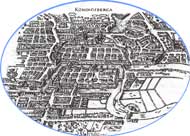Links
Graphs and Graph Theory
 http://www.c3.lanl.gov/mega-math/gloss/graph/gr.html
http://www.c3.lanl.gov/mega-math/gloss/graph/gr.html
 http://www.graphtheory.com
http://www.graphtheory.com
 http://www-leibniz.imag.fr/GRAPH/english/overview.html
http://www-leibniz.imag.fr/GRAPH/english/overview.html
 http://www1.cs.columbia.edu/~sanders/graphtheory/people/Harary.F.html
http://www1.cs.columbia.edu/~sanders/graphtheory/people/Harary.F.html
References
Poster Session
- [1] D. Liu, and X. Zhu,
Multi-level Distance Labelings for Paths and Cycles, SIAM J. Disc.
Math, to appear.
- [2] W.K.Hale, Frequency
Assignment: Theory and Applications, Proc IEEE, 68 (1980), 1497-1514.
- [3] G. Chartrand, D.
Erwin, F. Haray and P. Zhang, Radio Lablings of Graphs, Bull.
Inst. Combin. Appl., 33 (2001), 77--85.
- [4] G. Chartrand, D.
Erwin, and P. Zhang, A Graph Labeling Problem Suggested by FM Channel
Restrictions, Bull. Inst. Combin. Appl., accepted.
- [5] G. Chartrand, L.
Nebesky and P. Zhang, Radio k-colorings of Paths, Discuss. Math. Graph
Theory, accepted.
- [6] D. Liu, M. Xie,
Radio Numbers for Square of Paths, manuscript.
- [7] D. Liu, M. Xie,
Radio Numbers for Square of Cycles, manuscript.
- [8] P. Zhang, Radio
Labellings of Cycles, Arc. Combin. 65 (2002) 21—32.
Historical Sketch
- Brian Hopkins and Robin J. Wilson,
"The Truth about Königsberg," The College Mathematics Journal,
Vol. 35, No. 3, May 2004, pp. 198-207. [Note: The NCB
thanks Hopkins and Wilson for this invaluable historical source and translations.]
|
|
|
Historical Sketch

Königsberg
from
Euler's paper of 1736
Euler's 1736 paper on
the bridges of Königsberg is widely recognized as the origin of
graph theory.
Euler was prompted to investigate the 'calculus of position' by
a letter from the mayor of Danzig in Prussia (now Gdansk in Poland),
some 80 miles west of Königsberg.
Euler replied to the mayor that this type of problem "bears little
relationship to mathematics, and I do not understand why you expect a
mathematician to produce it......(M)ost noble Sir, you have assigned this
question to the geometry of position, but I am ignorant as to what this
new discipline involves..."
Euler, being the genius that he was, clearly was captivated. Soon
thereafter he wrote an Italian mathematician . . . .
|
|
|
"A problem was posed
to me about an island in the city of Königsberg, surrounded by a
river spanned by seven bridges, and I was asked whether someone could
traverse the separate bridges in a connected walk in such a way that each
bridge is crossed only once.....This question is so banal, but seemed to
be worthy of attention in that geometry, nor algebra, nor even the art
of counting was sufficient to solve it. In view of this, it occurred
to me to wonder whether it belonged to the geometry of position which Leibniz
had once so much longed for. And so, after some deliberation, I obtained
a simple, yet completely established, rule with whose help one can immediately
decided for all examples of this kind, with any number of bridges in any
arrangement ...."
Leonhard Euler
to Giovanni Marinoni
March 13, 1736
|
|
|
|
|